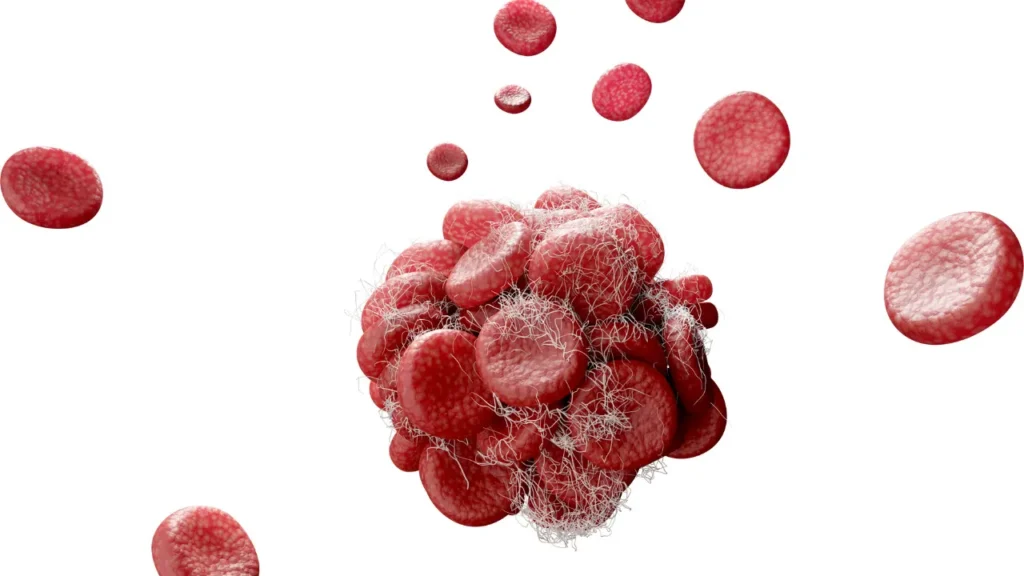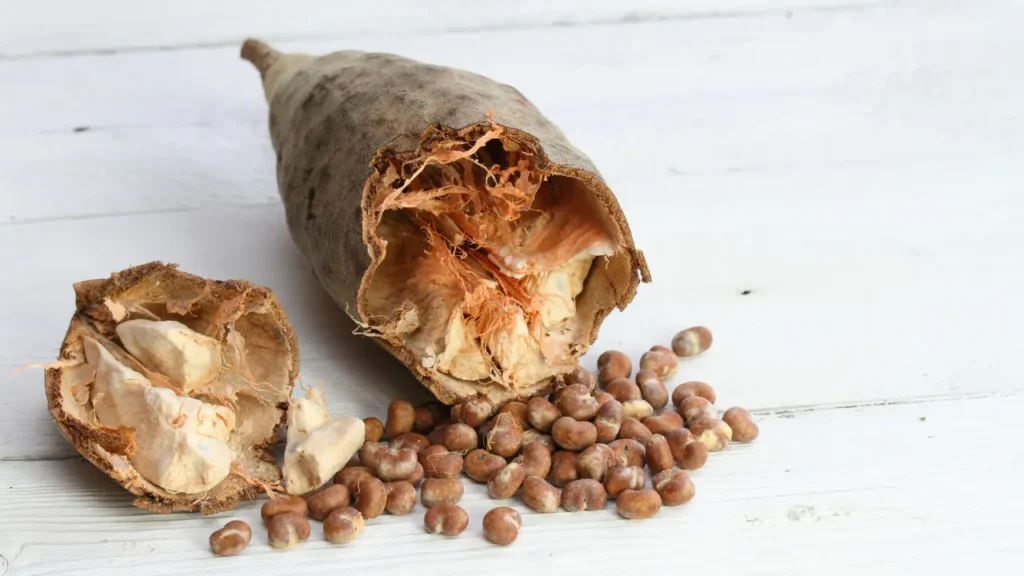The African baobab (Adansonia digitata) tree is well-known for its enormous, thick trunk, distinctive appearance, and the exceptional nutritional value of its fruit. Long used in traditional African medicine and food, the baobab fruit has recently acquired popularity as a nutritious supplement. This page provides a thorough guidance for safe use by delving into the chemical composition of the baobab fruit, its health advantages, ideal dosage, potential side effects, and drug interactions.
You May Also Like:
Wormwood: Benefits, Dosage, Side Effects, Drug Interactions, and Other Important Information
Wood Anemone: Benefits, Dosage, Side Effects, Drug Interactions, and Other Important Information
BAOBAB: Benefits, Dosage, Side Effects, Drug Interactions, And Other Important Information is an original (NootropicsPlanet) article.
Nature of Baobab
Adansonia digitata, also known as the baobab, is a native to the savannah parts of the African continent. It is referred to as the “Tree of Life,” and because of its exceptional qualities, it has earned a reputation as a representation of tenacity and endurance. Baobab trees can survive for thousands of years and can withstand hard, arid settings thanks to their thick, water-storing trunks.
Large, oval-shaped fruits with a tough, coconut-like shell are produced by the baobab tree. The fruit has a dry, powdery pulp inside the shell that is frequently consumed in its home countries because of its therapeutic and nutritional benefits. The fruit is frequently used in traditional African foods, drinks, and remedies. It has a somewhat acidic, sweet flavor. Africa uses the baobab tree’s leaves, seeds, and bark in a variety of ways since they are both nutritious and medicinal.
The remarkable resiliency of the baobab along with the fruit’s nutrient-rich content, which provides a wide range of health advantages, are what make it so special. The tree is used in traditional African medicine, where it is said to support vigor and vitality, because of its capacity to flourish in difficult environments. The recent rise in interest in baobab as a dietary supplement around the world has prompted more study into its special qualities, adding to our growing awareness of the nature and possible uses of this fascinating plant.
Health Benefits of Baobab
Numerous health advantages have been linked to eating baobab fruit. The baobab fruit’s high vitamin C content is essential for increasing immune cell formation and function as well as functioning as an antioxidant to shield cells from oxidative damage.
As previously indicated, the baobab fruit’s fiber content, especially pectin, helps healthy digestion by controlling blood sugar levels, decreasing cholesterol, and encouraging regular bowel movements. It has also been demonstrated that the bioactive substances found in baobab fruit, such as flavonoids and vitamin C, have strong antioxidant and anti-inflammatory qualities that can aid in the management of chronic diseases.
The calcium and magnesium in baobab fruit help the mineralization of bones and guard against diseases like osteoporosis. Meanwhile, the vital amino acids, vitamins, and minerals found in baobab fruit help to enhance the body’s ability to produce and use energy. Particularly due to its high potassium concentration, it supports healthy nerve and muscular function, which helps to save energy and lessen weariness (8).

Chemistry of Baobab
The baobab fruit is made up of a tough, coconut-like shell and a dry, powdery pulp that is packed with vitamins, minerals, and nutritional fibers. A notable aspect of the fruit’s nutritional profile is its high concentration of vitamin C, calcium, potassium, magnesium, and antioxidants. Furthermore, pectin, which makes up around 50% of the baobab fruit’s total fiber content, is a superb source of both soluble and insoluble dietary fiber.
The high concentration of bioactive phytochemicals found in baobab is one of the main substances contributing to its beneficial effects on health. These include triterpenes, flavonoids, and sterols, which have been shown to have strong anti-inflammatory, antioxidant, and antibacterial activitie. A range of important amino acids, including lysine, threonine, and valine, which are essential for immune system, metabolism, and protein synthesis, are also present in baobab fruit.
Physiological Mechanisms of Baobab
Due to its diverse nutrient profile and the bioactive substances it contains, baobab has physiological impacts on people. By scavenging reactive oxygen species (ROS) and encouraging the formation of anti-inflammatory mediators, the antioxidants in the fruit, particularly flavonoids and vitamin C, have been found to lessen oxidative stress and inflammation in the body (4). This process is very important for the management and prevention of chronic illnesses like diabetes, cardiovascular disease, and some forms of cancer.
The high fiber content of baobab fruit has also been associated with better gut health and digestion. Pectin is one example of a soluble fiber that forms a gel-like substance in the digestive tract. This substance helps control blood sugar levels, lower cholesterol, and increase feelings of fullness, all of which can help people consume less calories and possibly lose weight. Contrarily, insoluble fiber gives the stool volume and eases bowel motions, reducing constipation and enhancing gut health.

Optimal Dosage of Baobab
There is no one-size-fits-all baobab dosage because individual needs can differ based on characteristics like age, gender, health state, and lifestyle. Although baobab powder can be added to smoothies, yogurt, or other foods, it is generally advised to take 5 to 15 gm per day (9). To assess personal tolerance and prevent potential adverse effects, it is crucial to begin with a smaller dosage and gradually raise it.
Side Effects of Baobab
Baobab fruit is usually safe to eat, with few negative effects having been noted. However, due to its high fiber content, excessive consumption may result in gastrointestinal discomfort, such as bloating, gas, or diarrhea. Baobab contains a significant amount of oxalate, which may lead to the production of kidney stones in people who have a history of the condition. There is little data on the effects of baobab during pregnancy and lactation, so women who are planning to take it should speak with a healthcare provider beforehand.
Potential Substance Interactions with Baobab
Despite being generally safe to eat, baobab may interact with some drugs and substances:
- Anticoagulants: The baobab fruit contains vitamin K, which may inhibit the effects of anticoagulants like warfarin and raise the risk of blood clots (12). If using anticoagulants, it is imperative to speak with a medical practitioner before consuming baobab.
- Blood pressure drugs: The high potassium content of baobab may interact and amplify the effects of blood pressure medications such ACE inhibitors, resulting in abnormally low blood pressure (13). Before using baobab, people who are on blood pressure medication should closely check their blood pressure and speak with a healthcare provider.

Best Responsible Use of Baobab
It is essential to adhere to safe usage guidelines to maximize the advantages and reduce any potential hazards related to baobab supplementation. To guarantee the optimal, responsible usage of baobab, consider the following advice.
- Begin with a small dose: Starting with 5 gm of baobab powder per day, progressively raise the dosage as necessary, up to a daily maximum of 15 gm (9). This will reduce any potential adverse effects and help determine personal tolerance.
- Include baobab in a healthy diet: Baobab can be a beneficial supplement to your diet, but it shouldn’t take the place of other nutrient-rich foods. For optimum health and wellbeing, make sure to consume a balanced diet of fruits, vegetables, whole grains, lean meats, and healthy fats.
- Speak with a healthcare expert: Before adding baobab to your diet, get advice from a licensed healthcare expert, such as a nutritionist or doctor. Pregnant or nursing women, people taking medication, and people with pre-existing medical issues should pay particular attention to this.
- Select a top-notch product: To guarantee security and effectiveness, pick a reputed brand of baobab powder that has undergone quality, purity, and potency testing. To confirm the product’s quality, look for third-party certifications from organizations like NSF International or USP.
- Be aware of possible interactions: As was already noted, baobab may interact with some drugs, including anticoagulants and blood pressure medications. Before combining baobab with other medications, be aware of these possible interactions and speak with a doctor.
- Watch your reaction: Track changes in your energy levels, digestion, and general health on a regular basis to gauge how your body is responding to baobab supplements. If you have any negative effects, stop using it and seek medical advice.
By adhering to these guidelines for responsible usage, individuals can harness the power of baobab fruit as a nutritional supplement to improve their overall health and well-being while minimizing potential risks and side effects.
BAOBAB:
Conclusion
Baobab has both cultural and medicinal significance, acting as a tasty addition to various savory and sweet meals while offering nutritional benefits that can increase gut and bone health while maximizing energy levels. This fruit can be difficult to find in most grocery stores, but you can still experience the benefits of baobab through natural supplements like capsules or beverages.
Some people may experience bloating or kidney stones with over consumption of this fruit, so it is important to have a balanced diet if you plan on using baobab as a routine addition to your daily meals. When taking supplements like baobab, you should always listen to your body’s response to it. If you notice any prominent side effects, like itchiness or excessively low blood pressure, do not force yourself to continue taking the supplements.

References:
- Baobab fruit: A powerhouse of nutrients. Healthline. Retrieved from: https://www.healthline.com/nutrition/baobab
- Nutritional and health benefits of Baobab. Medical News Today. Retrieved from: https://www.medicalnewstoday.com/articles/306445
- The benefits of Baobab: A review of Adansonia digitata. ScienceDirect. Retrieved from: https://www.sciencedirect.com/science/article/pii/S2213453016300362
Important Note: The information contained in this article is for general informational purposes only, and should not be construed as health or medical advice, nor is it intended to diagnose, prevent, treat, or cure any disease or health condition. Before embarking on any diet, fitness regimen, or program of nutritional supplementation, it is advisable to consult your healthcare professional in order to determine its safety and probable efficacy in terms of your individual state of health.
Regarding Nutritional Supplements Or Other Non-Prescription Health Products: If any nutritional supplements or other non-prescription health products are mentioned in the foregoing article, any claims or statements made about them have not been evaluated by the U.S. Food and Drug Administration, and such nutritional supplements or other health products are not intended to diagnose, treat, cure, or prevent any disease.


